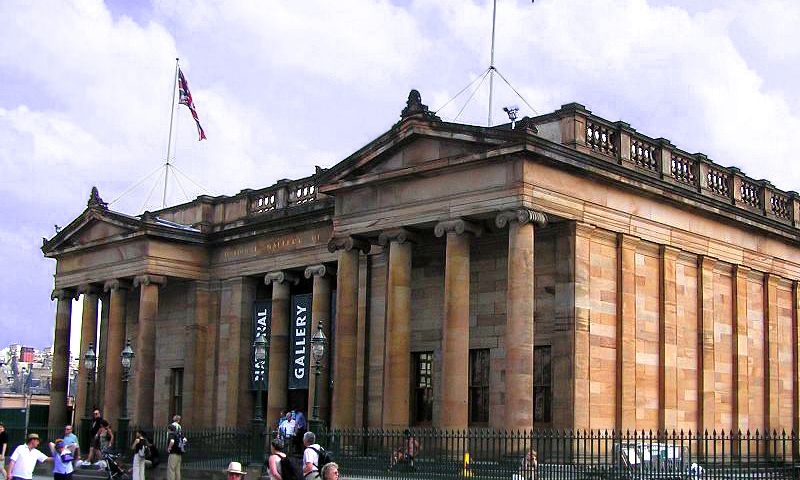The Scottish National Gallery in Edinburgh is owned by National Galleries of Scotland
The National Galleries of Scotland says it will continue to accept sponsorship from Baillie Gifford, the Scottish asset management company that has recently come under fire for its ties to the fossil fuel industry and Israel. In May, following protests, partnerships were ended between Baillie Gifford and nine book festivals—including Hay festival, Edinburgh international Book Festival and Cheltenham Literature Festival.
In a statement released online, “in response to recent coverage regarding sponsorship in the arts and cultural sector”, Anne Lyden, the director-general of the National Galleries of Scotland, says, “after a lot of thought and consideration, the [museum] plans to continue our relationship with Baillie Gifford”. Describing the situation as “a complex issue” with “many differing views”, the NGS says it is “confident that the funding we receive from Baillie Gifford meets our strong ethical standards”.
In response to requests to clarify the criteria and process for meeting such standards in the case of Baillie Gifford, a spokeswoman for the NGS says its ethics committee "reviewed our relationship" with the sponsor, while members of leadership team "met and consulted with Scottish Government, ALVA and with other leaders across the sector".
The spokeswoman also points to its ethical fundraising statement on its website. That statement notes that decisions to accept corporate support is based on four main principles: that it must “support the aims” of the NGS, it “should not damage the integrity or reputation” of the institution, it “should not impinge on the artistic or academic freedom” of the galleries and it “should not have undue influence on [its] policies”. Ultimately, responsibility resides with the board of trustees.
In the 2 July statement, Lyden goes on to note how the NGS offers a space for artists “to share experiences and perspectives with others, encouraging discussion and understanding of the world we live in”. This is “one of the main ways we can positively impact society”, the director-general says, “but it needs to be funded”. The galleries’ “world-class programme” of exhibitions, events and outreach “just wouldn’t be possible without support from partners like Baillie Gifford”, Lyden concludes. Critics say the institution's decision is "woefully out of tune" and that it now has "blood on its hands".
Problems first began to surface for Baillie Gifford last August when the climate activist Greta Thunberg pulled out of the Edinburgh International Book Festival, which it was sponsoring. In May this year, the campaign group Fossil Free Books ramped up its demands—and more than 200 authors including Naomi Klein, Sally Rooney and George Monbiot signed its statement, which called on Baillie Gifford to “divest from the fossil fuel industry and all companies involved in Israeli occupation, apartheid and genocide”. The number of signatories has since risen to more than 800.
Hay festival promptly dropped Baillie Gifford after several speakers boycotted the festival, while, days later, the Edinburgh International Book Festival and the asset firm “collectively agreed” to end their financial agreement. Sponsorships of Borders, Wimbledon BookFest, Cheltenham, Cambridge, Stratford, Wigtown and Henley festivals were subsequently cancelled.
The fallout has prompted criticism on both sides, with the future of book festivals and other cultural events, which have suffered enormous public funding cuts, now looking perilous. Speaking on the podcast The Rest is Entertainment, the Guardian columnist Marina Hyde described FFB as “puritans and wreckers”, saying that “art must be allowed to exist in and of itself and not have to be politicised”.
Baillie Gifford, meanwhile, has noted that only 2% of client money is invested in companies with links to fossil fuels; the market average is 11%. Fossil Free books also claimed that the company invests in US tech giants including Amazon and Meta, which have commercial dealings with the state of Israel—though, as critics have pointed out, most people could be considered complicit by these measures. Focusing on “strategy” not “moral purity” was the aim of the boycott, according to Fossil Free Books. Baillie Gifford further notes it is its clients (not the firm itself) who invest in these tech giants and such dealings are “tiny in the context of their overall business”.
According to an article in The Herald newspaper, investments show that in May, Baillie Gifford held 11,177,350 shares in the British arms company Babcock International, which has a Memorandum of Understanding with Israel Aerospace Industries Group. Those shares were then valued at just over £58m. A Baillie Gifford spokesman declined to comment on the length and value of its sponsorship of the NGS, but confirmed the Herald figures were accurate at the time.

